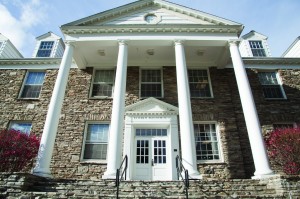With recent budget and staff cuts, every academic department essentially feels the weight of such changes and the restrictions that often follow; the Bible department specifically is struggling with current academic burdens.
The aforementioned budget cuts elicited the elimination of the adjunct professor position in the Bible department, a person previously depended upon to take up some of the load of teaching classes. The result, along with a current professor’s absence due to a year of sabbatical, created a deficiency of course offerings within the Bible major this semester.
Sarah Derck, Old Testament, acknowledged the restrictions applied to the department due to the budget cuts. One result is, she said, “for this academic year we had to rearrange the offerings, and not have quite as many upper level Bible courses available.”
From the perspective of a current senior Bible major, such a deficiency comes as a sudden inconvenience. The majority of seniors in the department accepted independent study courses this spring as a means of meeting course requirements in order to complete their degrees.
Billy Marshall, senior Bible major, expressed his frustration in this current lack of course offerings. He said, “The lack of courses being offered for Bible majors is more than a simple inconvenience–it’s frustrating beyond belief…. As a Christian college we shouldn’t just offer Bible courses that cover the fundamentals.”
As Biblical Literature remains a required introductory-level course for all graduates, the remaining Bible professors, namely Sarah Derck and Terrence Paige, now must dedicate more of their time teaching that specific class this semester. The remaining few upper-level classes are currently offered every year, and as a result senior Bible majors find the classes offered those already taken, and therefore must resort to independent study courses.
 Unlike Marshall, other students see an independent study course as an opportunity to study something they find specific interest in. One such senior, Christine Brienen, spoke of her experience within the Bible major. While expressing disappointment in the fact that the Bible department withdrew a two credit, upper-level course on the book of Psalms due to lack of staff this spring, Brienen said, regarding her current independent study course, “It’s an opportunity I wouldn’t have had if Psalms would have been offered, and it’s a more focused course in what I want to be doing after school.”
Unlike Marshall, other students see an independent study course as an opportunity to study something they find specific interest in. One such senior, Christine Brienen, spoke of her experience within the Bible major. While expressing disappointment in the fact that the Bible department withdrew a two credit, upper-level course on the book of Psalms due to lack of staff this spring, Brienen said, regarding her current independent study course, “It’s an opportunity I wouldn’t have had if Psalms would have been offered, and it’s a more focused course in what I want to be doing after school.”
Although the department faces these cuts and lack of course offerings, Derck places emphasis on the future. Concerning the shortage of upper-level courses, she said, “It’s a temporary thing… and it’s actually a great opportunity to think creatively and strategically.”
Such creative thinking resulted in Derck’s anticipation of a “broader range of Bible courses” in the coming year. The normally offered courses, such as the Pentateuch, will be offered every other spring, as opposed to every spring, leaving room for new course offerings in the semesters its absence leaves.
The department also plans on offering some future classes as two or three credit courses, in order to create flexibility within the major.
One consolation found amid the current deficiencies and frustrations of the department is the fact that these issues are not unique to the Bible department. As Derck said, “Going forward we are engaging in what folks all across the college are doing, and that’s trying to figure out how to balance the offerings that our students need, and create a way that allows us to move into the 21st century of higher education, which is, as everybody knows, a totally new ball game.”



